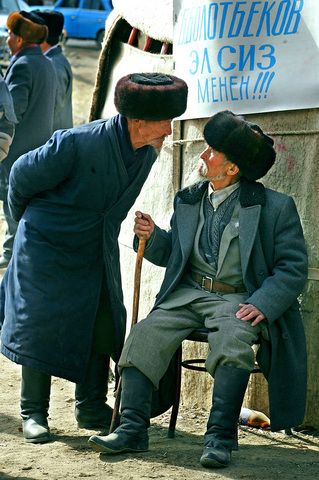The revolution has a name, even though it hasn't happened.
Ahead of tomorrow's parliamentary elections in Kyrgyzstan, speculation is high that this remote, mountainous ex-Soviet republic is on the verge of an uprising like those in Georgia and Ukraine that were sparked by election fraud.

PHOTO: AP
News media, drawing stylistically on Georgia's "Rose Revolution" and Ukraine's "Orange Revolution," have begun calling Kyrgyzstan's national uprising the "Tulip Revolution."
There isn't a trace of Kyrgyzstan's favorite flower to be seen amid February's snows, but signs of discontent are rising.
The vote is a key test for Kyrgyzstan, once seen as an "island of democracy" in former Soviet Central Asia but now troubled by increasing complaints of repression. It will be closely watched by international observers and domestic politicians not only for its own importance, but as a harbinger of how the October presidential election is likely to be conducted.
The vote also is likely to be watched closely by Washington and the Kremlin, which have strategic interests in stability in Kyrgyzstan, where both Russia and the US have military bases.
Ahead of the vote, the most volatile issue has not been the prospect of vote fraud, as was the case in Ukraine and Georgia, but the blocking of prominent politicians from running at all. Demonstrators backing two disqualified candidates blocked key roads this week, shutting down a main trade corridor to China and slowing production at the Kumtor gold mine, a key piece of the economy of the country of 5 million.
Another leading opposition figure, Roza Otunbayeva, was denied registration as a candidate on the grounds that she did not meet the requirement of having been a resident for the last five years -- but the reason she couldn't meet it was because she had been one of Kyrgyzstan's top diplomats, posted to Britain and the US as well as working as a UN envoy for Abkhazia.
Otunbayeva wanted to run for a seat in the same district where Akayev's daughter, Bermet, is a candidate. That added to concerns the government was using legal hairsplitting to marginalize Otunbayeva and she now is seen as likely a central figure if protests break out.
But Otunbayeva denies that she and her colleagues in the Ata-Jurt political movement are preparing to take to the streets.
"We in the opposition isn't talking about a revolution of any kind," she said recently during a trip to Moscow. "We're talking about a peaceful, constitutional change of power."
Such a transition once seemed likely in Kyrgyzstan. Akayev, who has led the country since independence from the Soviet Union, was regarded as the most reform-minded of the Central Asian leaders and the country won praise for its comparative openness.
But Akayev in recent years has shown increasing signs of cracking down. In 2002, his reputation was tarnished after police killed six demonstrators who were protesting the arrest of an opposition lawmaker.

PRECARIOUS RELATIONS: Commentators in Saudi Arabia accuse the UAE of growing too bold, backing forces at odds with Saudi interests in various conflicts A Saudi Arabian media campaign targeting the United Arab Emirates (UAE) has deepened the Gulf’s worst row in years, stoking fears of a damaging fall-out in the financial heart of the Middle East. Fiery accusations of rights abuses and betrayal have circulated for weeks in state-run and social media after a brief conflict in Yemen, where Saudi airstrikes quelled an offensive by UAE-backed separatists. The United Arab Emirates is “investing in chaos and supporting secessionists” from Libya to Yemen and the Horn of Africa, Saudi Arabia’s al-Ekhbariya TV charged in a report this week. Such invective has been unheard of

‘TERRORIST ATTACK’: The convoy of Brigadier General Hamdi Shukri resulted in the ‘martyrdom of five of our armed forces,’ the Presidential Leadership Council said A blast targeting the convoy of a Saudi Arabian-backed armed group killed five in Yemen’s southern city of Aden and injured the commander of the government-allied unit, officials said on Wednesday. “The treacherous terrorist attack targeting the convoy of Brigadier General Hamdi Shukri, commander of the Second Giants Brigade, resulted in the martyrdom of five of our armed forces heroes and the injury of three others,” Yemen’s Saudi Arabia-backed Presidential Leadership Council said in a statement published by Yemeni news agency Saba. A security source told reporters that a car bomb on the side of the road in the Ja’awla area in

US President Donald Trump on Saturday warned Canada that if it concludes a trade deal with China, he would impose a 100 percent tariff on all goods coming over the border. Relations between the US and its northern neighbor have been rocky since Trump returned to the White House a year ago, with spats over trade and Canadian Prime Minister Mark Carney decrying a “rupture” in the US-led global order. During a visit to Beijing earlier this month, Carney hailed a “new strategic partnership” with China that resulted in a “preliminary, but landmark trade agreement” to reduce tariffs — but

SCAM CLAMPDOWN: About 130 South Korean scam suspects have been sent home since October last year, and 60 more are still waiting for repatriation Dozens of South Koreans allegedly involved in online scams in Cambodia were yesterday returned to South Korea to face investigations in what was the largest group repatriation of Korean criminal suspects from abroad. The 73 South Korean suspects allegedly scammed fellow Koreans out of 48.6 billion won (US$33 million), South Korea said. Upon arrival in South Korea’s Incheon International Airport aboard a chartered plane, the suspects — 65 men and eight women — were sent to police stations. Local TV footage showed the suspects, in handcuffs and wearing masks, being escorted by police officers and boarding buses. They were among about 260 South